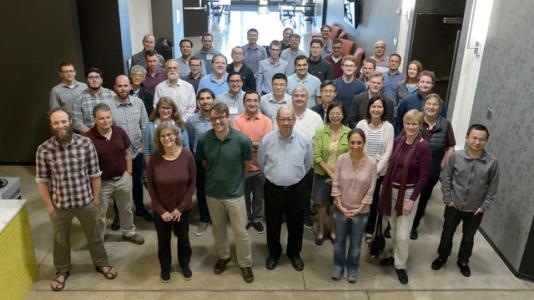
The SciDAC4 FASTMath project held its annual all-hands meeting June 10–11, 2019, at Argonne National Laboratory.
The FASTMath-4 Institute, funded by the U.S. Department of Energy (DOE), develops and deploys scalable mathematical algorithms and software tools for reliable simulation of complex physical phenomena on DOE supercomputers. The institute team also collaborates with application scientists to ensure the usefulness and applicability of FASTMath technologies.
The first day of this year’s FASTMath workshop included technical summaries of eight areas (structured mesh, unstructured mesh, time integrators, linear solvers, eigensolvers, optimization, uncertainty quantification and data analytics) and poster presentations about the advances being made by FASTMath researchers in four of those areas (structured mesh, linear solvers, eigensolvers and uncertainty quantification). Also included were talks from several SciDAC partners and a presentation on “A View from DOE” about the role of the FASTMath institute in meeting DOE application needs.
The second day began with presentations about three DOE supercomputers – at the Argonne Leadership Computing Facility, the Oak Ridge Leadership Computing Facility and the National Energy Research Scientific Computing Center – followed by a discussion of the next-generation extreme-scale architectures and the challenges and benefits that these architectures present. Also included were poster presentations on unstructured mesh, time integrators, optimization and data analytics. The workshop concluded in the afternoon with a discussion of potential collaboration opportunities and ways in which the broader computational science community can join in building a more unified and effective computational mathematics community across the DOE complex.
More than 40 people attended the all-hands meeting, with representatives from several national laboratories (Argonne, Lawrence Berkeley, Lawrence Livermore, Oak Ridge and Sandia) and four universities (the Massachusetts Institute of Technology, Rensselaer Polytechnic Institute, the University of Colorado Boulder and the University of Southern California) and with remote participation by Jefferson Lab).
For further information about the FASTMath project, see the website: https://fastmath-scidac.llnl.gov.